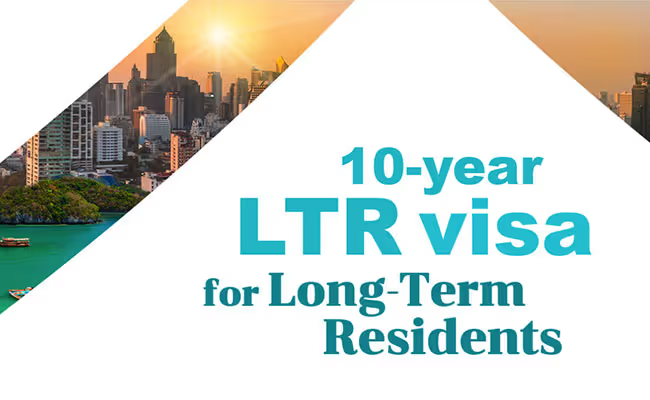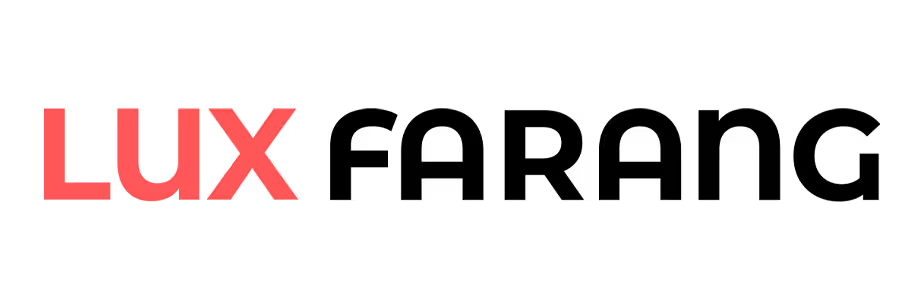LTR visa in Thailand
LTR visa to Thailand up to 10 years of residence, work without quotes, tax breaks, opportunity to take a family. Conditions, categories, registration process.

What is LTR Visa
LTR Visa is a long-term resident visa for foreigners with “high potential” (Long-Term Resident Visa).
Benefits of the LTR visa in Thailand
1.Long term accommodation without any hassle
An LTR visa is issued for 5 years with the possibility of extending it for another 5 years — as a result, you can live in Thailand for up to 10 years without having to issue new documents each time
2. Minimum bureaucracy
- Instead of regular reporting every 90 days, just one visit a year to the One Stop Service center.
- You can leave the country and return without restrictions — you do not need a re-entry permit.
- At the border, priority is given to passport control (Fast Track) at international airports.
3. Legal work and no quotas
- A digital work permit is issued quickly and conveniently.
- There is no need to hire 4 Thais for every foreigner — there are no restrictions on numbers.
4. Tax breaks
- Foreign income is not taxed (for investors, retirees and remote workers).
- For qualified specialists in key areas, the fixed tax rate is 17%.
Categories and requirements
LTR visa for wealthy foreigners
If you have substantial savings and are ready to invest in Thailand, you can get an LTR visa under the “Wealthy Global Citizens” category.
What do you need:
- Assets from $1,000,000
- Your property, bank accounts, securities can all count if you confirm value and ownership.
- Investments in Thailand from $500,000
- Suitable:
- Government bonds with a residual period of 5 years or more
- Investments in Thai companies (including venture funds and Private Equity Trust registered with the SEC)
- Residential or commercial property that meets the requirements of the visa program
What you need to apply for a visa
Wealthy pensioners
An LTR visa can be granted to foreign citizens who have reached the age of 50 and meet the following financial criteria:
- Annual income of at least $80,000 — at the time of applying for a visa, or
- Annual income of $40,000 or more, subject to additional investments in the Thai economy amounting to at least $250,000. Investments in government bonds, real estate or direct investments are considered suitable.
⚠️ It is important: Only passive sources of income are taken into account, such as pension payments, rents, dividends, royalties, interest income. Active forms of income (wages, entrepreneurship, etc.) are not taken into account in accordance with BOI requirements.
What you need to apply for a visa
Remote specialists and employees of international companies
An LTR visa in this category is intended for foreigners who officially work remotely from Thailand for foreign companies.
Financial criteria for the applicant:
The candidate must prove a stable income under one of the following conditions:
- The average annual income over the past 2 years — from 80,000 US dollars;
- Average annual income from 40,000 to 80,000 US dollars, if one of the additional requirements is met:
- a master's degree or higher;
- ownership of registered intellectual property;
- attracting Series A investments from $1 million (provided that the startup has completed the seed phase and entered the growth stage)
Employer requirements:
The company where the applicant works must meet one of the following criteria:
- be public and traded on the official stock exchange;
- be a private company that has been operating for at least 3 years and showing total revenue from 50 million US dollars over the past 3 years;
- be a subsidiary whose parent company meets the above requirements.
An LTR visa under this category allows you to operate remotely legally while in Thailand for a long time.
What you need to apply for a visa
Highly qualified specialists
The LTR visa in this category is intended for qualified foreigners engaged in strategically important sectors of the Thai economy. They can be employed:
- in Thai commercial organizations;
- in scientific and educational institutions and research institutes;
- in government departments and agencies in the Kingdom.
Financial conditions:
The candidate must confirm income under one of the following schemes:
- Starting from $80,000 per year on average over the past two years;
- Starting from $40,000 per year for the same period — subject to availability:
- master's degrees (or higher) in science or technology;
- proven professional expertise relevant to the development of a particular industry in Thailand
⚠️ Important: for professionals working in government agencies, income requirements may not be relevant.
Priority areas:
- Automotive industry
- Electronic technologies
- High-level tourism
- Agriculture, food industry and biotechnology
- Logistics and transport systems
- Robotization and production automation
- Aviation and aerospace industry
- Energy from biofuels and biochemical processes
- Chemical and petrochemical industry
- Digital sector
- Healthcare and medical technology
- Defense industry
- Environmentally oriented economy (including waste management)
- International Business Centers (IBC)
Additionally - specialists in the following fields are in demand:
- R&D in biotechnology, nanotechnology, digital solutions and new materials;
- Higher and professional education;
- Artificial intelligence and digital transformation;
- Financial and business analysis;
- Ecology, resource management and sustainable development;
- Innovation management and startup development;
- Legal support for alternative dispute resolution methods;
- Support for international trade and economic initiatives.
What you need to apply for a visa
LTR visa for the main applicant's family
Not only main applicants, but also their immediate family members can obtain a long-term LTR visa. However, it is important to remember that the updated rules announced in February 2025 have not yet entered into force
- they will take effect after the official publication of regulations by the Ministry of Internal Affairs and the Immigration Bureau of Thailand.
Currently, a visa can be issued by:
- Registered spouse/wife - if there is an official marriage.
- As of January 22, 2025, Thailand will officially recognize same-sex marriage — this also applies to the LTR visa.
- Children under 20 years old — subject to the submission of documents confirming family ties.
- Maximum 4 dependents may be included in the application of one main applicant.
What will change after the introduction of the new rules:
- The limit on the number of dependents will be removed.
- It will be allowed to include parents the applicant if there are documents confirming the relationship.
- The list of dependents will be expanded — it will be possible to add persons under official guardianship or trusteeship.
- The definition of “dependent” will become more flexible.
- However, children over 20 will only be able to be included by exception - if they are found to be legally dependent on the main applicant.
What is required for registration
Prerequisites for all categories of LTR visa applicants
Regardless of the category chosen, each applicant must confirm that they have one of the following types of financial or insurance coverage:
- Health insurance — with minimum coverage of at least 50,000 US dollarsoperating in Thailand;
- Social insurance — provided that it guarantees access to medical services in Thailand;
- Bank deposit:
- For the main applicant — from 100,000 US dollarsdeposited in a bank account at least 12 months prior to application;
- For family members — from 25,000 US dollars, also with a 12-month placement period before submission.
Requirements for real estate eligible for LTR investments
For the purposes of obtaining an LTR visa, only properties that meet a number of criteria are taken into account:
- Freehold (full ownership):
- Condominium apartments, detached houses and other buildings are acceptable. At the same time, ownership must be registered directly addressed to the applicant.
- Leasehold (long term rent):
- Apartments, houses and land with the remaining rental period are accepted at least 10 years, provided that the tenant is the applicant himself.
❗ Important: real estate registered to a legal entity (for example, a company), is not recognized as an investment asset as part of the LTR visa program.
Tax advantages for LTR visa holders: exemption from foreign income tax
LTR visa holders who fall into the following categories:
- “Wealthy citizens of the world”
- “Wealthy pensioners”
- “Remote professionals working from Thailand”
are entitled to full tax exemption for income earned outside Thailand.
The exemption applies to all types of foreign income covered by Article 40 of the Thai Tax Code - including income from employment, business, and income from owning assets abroad if they were transferred to Thailand during the past tax period.
Establishment: Royal Decree No. 743 (2022)
This position makes staying in Thailand not only comfortable, but also financially beneficial for international professionals and investors.
A flat rate of 17% for qualified professionals with a LTR visa
Foreign professionals working in Thailand in priority industries and holding a LTR visa are eligible for a flat tax rate of 17% to your income from work.
Conditions for applying the benefit:
- The employer is obliged to officially notify the tax authorities about the employee's right to receive a tax preference.
- After the notification is confirmed by the tax service, the 17% rate begins to apply.
- The employer deducts tax at this rate directly from wages.
- The employee himself files a tax return annually, which states the income eligible for the benefit separately from all other income.
Important notes:
- Benefit does not apply automatically — it is activated only after submitting an appropriate notification.
- The rate is 17% applies only to income from employmentreceived after official confirmation from the tax authorities.
- Income that is not covered by the LTR visa program is taxed according to the standard progressive scale.
Failure to comply with conditions - loss of eligibility for benefits
In case of breach of obligations, including late submission of tax reports, the right to a fixed rate is canceled. In this case, the usual tax system applies.
Exercise of the right to a preferential 17% tax rate: procedure
A tax preference in the form of a flat rate of 17% for qualified professionals who have obtained an LTR visa, does not take effect automatically. To start using this benefit, you must go through a formal procedure.
Benefit activation algorithm:
- The first step is that the employer sends a notification to the tax authority confirming the employee's right to apply a special tax regime.
- After the notification is submitted, the benefit begins: from then on, a flat rate of 17% applies.
- The employer withholds tax at this rate from the employee's salary and reports to the tax service.
- The employee himself is required to file an annual tax return, which separately indicates income received under the LTR scheme.
Key conditions:
- Income received before the notification was filed, as well as income that is not related to employment (for example, investment, rental income, etc.) ), do not fall under the preferential rate.
- This income is taxed according to the standard progressive tax scale.
- Violation of rules — including late filing — results in the loss of the right to apply the 17% rate. In this case, the general taxation system will be applied, as for all residents.
Thus, in order to fully use the tax benefit, it is important to comply with all formalities and maintain an appropriate level of tax discipline.
Procedure for applying for an LTR visa: stages and deadlines
To apply for an LTR visa, you must register on the program's official website and upload a set of documents corresponding to the selected category.
Electronic submission:
The entire process — from submitting the application form to uploading additional documents (if necessary) — takes place online through the applicant's personal account. The Board of Investment of Thailand (BOI) may request additional materials, and they are also transmitted electronically.
Review dates:
The application is formally considered within 20 business days after providing the full set
documents. However, in reality, if clarifications or additional details are required, the procedure may take 2 to 3 months.
Obtaining a visa:
After approval of the application, the applicant has 60 daysto choose the date and place of obtaining a visa:
- Thailand Investment and Expat Services Center (TIESC) in Bangkok;
- Or one of Thailand's diplomatic missions abroad.
The place of receipt of the stamp can be changed when the status is reached “Qualification Approved”, however, for members
for families, it must coincide with the place of registration of the main applicant.
Visa fee:
The cost of obtaining a visa is 50,000 baht per person, if the registration takes place in Thailand. When
The amount submitted through consulates abroad may vary. Examples of current fees:
- Moscow: 2,000 USD
- Washington: 1,600 USD
- Dubai: 8,000 AED
- London: 1,500 GBP
- Sydney: 3,000 AUD
- Paris and Rome: 1,750 EUR
- Singapore: 2,500 SGD
- New Delhi: 125,000 INR
- Tokyo: 220,000 JPY
The final amount depends on the internal policy of a particular consulate.
Work permit for LTR visa holders: who is entitled to it and how to apply for it
An LTR visa not only gives you the right to long-term residence, but in some cases allows you to officially work in
Thailand. However, the eligibility for a work permit depends on the visa category.
Who is eligible for permission:
- Highly qualified specialists
- It is mandatory to obtain a work permit — usually simultaneously with obtaining an LTR visa.
- Wealthy investors and retirees
- They can apply for a permit after the visa is approved. This makes it possible to work officially in Thailand.
- Remote specialists
- This category is not eligible for employment in Thai companies, as it involves working exclusively for foreign employers.
- Family members
- Relatives of the main applicant (included in the LTR visa) can also apply for permission, regardless of the status of the main recipient.
How to apply:
- The application is submitted through your personal account on the program's website.
- The employer must complete and sign the form WP46.
- The following documents are attached to the application:
- Company registration certificate;
- Official extract (Company Affidavit);
- List of shareholders (form Bor.Or.Jor.5);
- Up-to-date financial statements;
- A list of all foreign employees with their positions and work permit status.
⚠️ Additional documents may be requested, which increases the review period.
Processing times:
From 7 to 14 working days depending on the complexity of the case.
The final stage: obtaining a permit
After approval:
- An appointment is made at the Single Window Center for Visas and Permits;
- The fee is paid: 100 baht per submission + 3,000 baht for each year the permit is valid (maximum — 5 years, total amount — 15,100 baht);
- A photo is taken for a digital profile;
- Activates digital resolution to work through the official app.
Temporary right to work
While the application for permission is being considered, the LTR visa holder can temporarily perform work dutieswithout waiting for official approval.
Need help applying for an LTR visa?
If you are planning to apply for an LTR visa and want to be sure of the result, please contact our manager. We accompany clients at all stages and help you take into account all the nuances so that you can get a visa and take advantage of its benefits without further delay https://t.me/thailand_manager



.jpeg)
